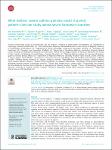What bothers severe asthma patients most? A paired patient–clinician study across seven European countries
| dc.contributor.author | Ainsworth, Ben | |
| dc.contributor.author | Chatburn, E | |
| dc.contributor.author | Bansal, AT | |
| dc.contributor.author | Fulton, Olivia | |
| dc.contributor.author | Hamerlijnck, Dominique | |
| dc.contributor.author | Coleman, C | |
| dc.contributor.author | Eger, Katrien | |
| dc.contributor.author | Hyland, Michael | |
| dc.contributor.author | Holmes, J | |
| dc.contributor.author | Heaney, L | |
| dc.contributor.author | Sedlák, V | |
| dc.contributor.author | Škrgat, S | |
| dc.contributor.author | Edelbaher, N | |
| dc.contributor.author | ten Brinke, A | |
| dc.contributor.author | Porsbjerg, C | |
| dc.contributor.author | Gaga, Mina | |
| dc.contributor.author | Chaves Loureiro, Claudia | |
| dc.contributor.author | Djukanovic, R | |
| dc.contributor.author | Berret, E | |
| dc.contributor.author | Kwon, N | |
| dc.date.accessioned | 2023-12-22T14:07:42Z | |
| dc.date.available | 2023-12-22T14:07:42Z | |
| dc.date.issued | 2023-05 | |
| dc.identifier.issn | 2312-0541 | |
| dc.identifier.issn | 2312-0541 | |
| dc.identifier.other | ARTN 00717-2022 | |
| dc.identifier.uri | https://pearl.plymouth.ac.uk/handle/10026.1/21831 | |
| dc.description.abstract |
Introduction Severe asthma is a complex, multidimensional disease. Optimal treatment, adherence and outcomes require shared decision-making, rooted in mutual understanding between patient and clinician. This study used a novel, patient-centred approach to examine the most bothersome aspects of severe asthma to patients, as seen from both perspectives in asthma registries. Methods Across seven countries, 126 patients with severe asthma completed an open-ended survey regarding most the bothersome aspect(s) of their asthma. Patients’ responses were linked with their treating clinician who also completed a free-text survey about each patient’s most bothersome aspect(s). Responses were coded using content analysis, and patient and clinician responses were compared. Finally, asthma registries that are part of the SHARP (Severe Heterogeneous Asthma Research collaboration, Patientcentred) Clinical Research Collaboration were examined to see the extent to which they reflected the most bothersome aspects reported by patients. Results 88 codes and 10 themes were identified. Clinicians were more focused on direct physical symptoms and were less focused on “holistic” aspects such as the effort required to self-manage the disease. Clinicians accurately identified a most bothersome symptom for 29% of patients. Agreement was particularly low with younger patients and those using oral corticosteroids infrequently. In asthma registries, patient aspects were predominantly represented in questionnaires. Conclusions Results demonstrated different perspectives and priorities between patients and clinicians,with clinicians more focused on physical aspects. These differences must be considered when treatingindividual patients, and within multidisciplinary treatment teams. The use of questionnaires that includemultifaceted aspects of disease may result in improved asthma research. | |
| dc.format.extent | 00717-2022 | |
| dc.format.medium | Electronic-eCollection | |
| dc.language | en | |
| dc.publisher | European Respiratory Society (ERS) | |
| dc.subject | Asthma | |
| dc.subject | Lung | |
| dc.subject | Clinical Research | |
| dc.subject | 7.3 Management and decision making | |
| dc.subject | 7.1 Individual care needs | |
| dc.subject | Respiratory | |
| dc.title | What bothers severe asthma patients most? A paired patient–clinician study across seven European countries | |
| dc.type | Journal Article | |
| plymouth.author-url | https://www.webofscience.com/api/gateway?GWVersion=2&SrcApp=PARTNER_APP&SrcAuth=LinksAMR&KeyUT=WOS:000994352900009&DestLinkType=FullRecord&DestApp=ALL_WOS&UsrCustomerID=11bb513d99f797142bcfeffcc58ea008 | |
| plymouth.issue | 3 | |
| plymouth.volume | 9 | |
| plymouth.publication-status | Published | |
| plymouth.journal | ERJ Open Research | |
| dc.identifier.doi | 10.1183/23120541.00717-2022 | |
| plymouth.organisational-group | |Plymouth | |
| plymouth.organisational-group | |Plymouth|Research Groups | |
| plymouth.organisational-group | |Plymouth|Research Groups|Centre for Brain, Cognition and Behaviour (CBCB) | |
| plymouth.organisational-group | |Plymouth|Research Groups|Centre for Brain, Cognition and Behaviour (CBCB)|Behaviour | |
| plymouth.organisational-group | |Plymouth|Faculty of Health | |
| plymouth.organisational-group | |Plymouth|Faculty of Health|School of Psychology | |
| plymouth.organisational-group | |Plymouth|Users by role | |
| plymouth.organisational-group | |Plymouth|Users by role|Academics | |
| dc.publisher.place | England | |
| dcterms.dateAccepted | 2023-02-27 | |
| dc.date.updated | 2023-12-22T14:07:09Z | |
| dc.rights.embargodate | 2023-12-23 | |
| dc.identifier.eissn | 2312-0541 | |
| rioxxterms.versionofrecord | 10.1183/23120541.00717-2022 |


